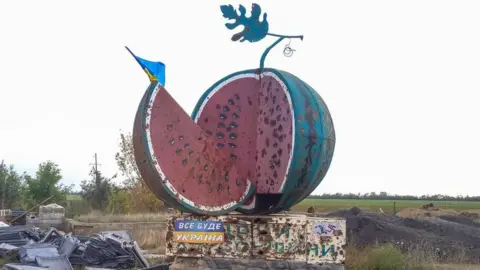Why did Zelensky want a watermelon in Kherson?
When President Volodymyr Zelensky visited the newly liberated city of Kherson he joked that he was there because he "wanted a watermelon".
It was important to support people there despite the continuing risk, he added. But why a watermelon?
The president was referencing the fruit that has become an internet meme in the last few days - a fruit that is a symbol of the southern Ukrainian region.
Most watermelons in Ukraine come from Kherson, a farming city on the Black Sea. Its humid climate allows the fruit to flourish.
When Russia invaded Ukraine in February watermelon exports came to a standstill. As monuments dedicated to the watermelon there show, its symbolic status predates the invasion.
 Getty Images
Getty ImagesThe fruit has long been associated with the region, Ukrainian-born chef and food writer Olia Hercules told the BBC. She grew up in the region and has memories of her grandfather fermenting a watermelon in a tub in the garden.
Watermelons are said to have been introduced to the Kherson region by Crimean Tatars centuries ago. In the 1940s and 50s, in the lean years after World War Two, people in the region would boil watermelon down into a molasses or jam when sugar was hard to come by, Ms Hercules said.
Visiting Kherson in the summer she said, "I'd always know I was home seeing trucks on the side of the road with people selling watermelons."
Before the current war, a televised yearly tradition marking the start of harvest season would see a barge full of watermelons leave Kherson for Kyiv via the River Dnipro.
According to the Ukrainian English-language paper Kyiv Post, the annual watermelon barge journey itself restarted in 2017 after a 14-year pause. The excitement over watermelons at the time was so potent that an unofficial parody Twitter account was started on behalf of "a watermelon on the barge".
The short-lived tradition didn't continue after the Russian invasion, but the image of a watermelon as mascot for the city was elevated to represent Kherson's struggle for freedom under occupation.
That's likely why the watermelon meme exploded in popularity once Russia's troops had retreated across the river.
Ukraine's Prime Minister Denys Shmyhal tweeted a picture of himself holding a watermelon. Various organisations, including Dynamo Kyiv football team and Ukraine's national post, temporarily reworked their logos to include the fruit.
Allow X content?
Allow X content?
Kherson was captured in early March, soon after Russia launched its invasion - and it was the only regional capital to be taken by Russia in the war.
Kherson region was then one of four to be illegally annexed by Russia after self-styled referendums in September.
Following Russia's withdrawal from the city, officials warned on Sunday that the war is "far from over". But locals were jubilant in Kherson's central square, and many were reunited with friends and loved ones they hadn't see in months.
As Kherson residents celebrated, watermelons again took centre stage - some Ukrainian troops were handed the fruits as they entered the city.
One video showed locals embracing a Ukrainian soldier clutching a hefty watermelon to his chest.
In another video showing similar celebrations in neighbouring Odesa, schoolchildren played with a bouncy watermelon-coloured ball.
